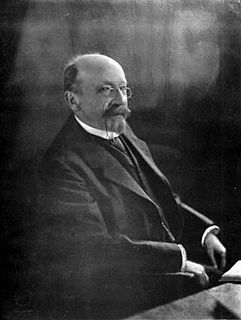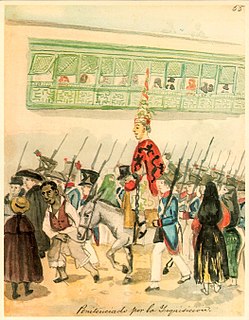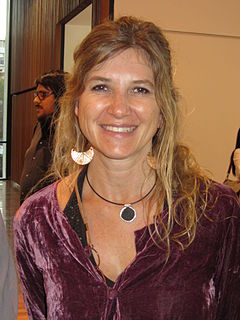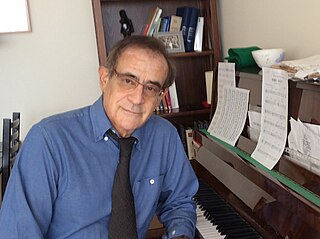Related Research Articles

Mapuche is an Araucanian language related to Huilliche spoken in south-central Chile and west central Argentina by the Mapuche people. It is also spelled Mapuzugun and Mapudungu. It was formerly known as Araucanian, the name given to the Mapuche by the Spaniards; the Mapuche avoid it as a remnant of Spanish colonialism.

José Toribio Medina Zavala was a Chilean bibliographer, prolific writer, and historian. He is renowned for his study of colonial literature in Chile, printing in Spanish America and large bibliographies such as the Biblioteca Hispano-Americana.
A Real Audiencia, or simply an Audiencia, was an appellate court in Spain and its empire. The name of the institution literally translates as Royal Audience. The additional designation chancillería was applied to the appellate courts in early modern Spain. Each audiencia had oidores.
The concept of limpieza de sangre, limpeza de sangue or neteja de sang, literally "cleanliness of blood" and meaning "blood purity", was a system of discrimination used in early modern Spain and Portugal.
Hernán Neira is a Chilean writer, philosopher and university professor.

The Peruvian Inquisition was established on January 9, 1570 and ended in 1820. The Holy Office and tribunal of the Inquisition were located in Lima, the administrative center of the Viceroyalty of Peru.

Lope de Barrientos (1382–1469), sometimes called Obispo Barrientos, was a powerful clergyman and statesman of the Crown of Castile during the 15th century, although his prominence and the influence he wielded during his lifetime is not a subject of common study in Spanish history.

Peruvian Ribereño Spanish or Peruvian Coastal Spanish is the form of the Spanish language spoken in the coastal region of Peru. The Spanish spoken in Coastal Peru has four characteristic forms today: the original one, that of the inhabitants of Lima near the Pacific coast and parts south, ; the inland immigrant sociolect ; the Northern, in Trujillo, Chiclayo or Piura; and the Southern. The majority of Peruvians speak Peruvian Coast Spanish, as Peruvian Coast Spanish is the standard dialect of Spanish in Peru.
Francisco Ibáñez de Segovia y Peralta (1644–1712) was a Spanish colonial administrator who was Royal Governor of Chile from 1700 to 1709. He was born in Madrid and died in Lima.

Francisco de Aguirre was a Spanish conquistador who participated in the conquest of Peru, Bolivia, Chile and Argentina.
José Luis Osvaldo Lira Pérez SS.CC. was a Chilean priest, philosopher and theologian. Author of more than 10 books on topics related to the philosophy of St. Thomas Aquinas, as well as Ortega y Gasset and Juan Vázquez de Mella. He devoted most of his life to teaching in different universities, and had as many followers as opponents.
Pedro de Candia was a Greek explorer and cartographer at the service of the Kingdom of Spain, an officer of the Royal Spanish Navy that under the Spanish Crown became a Conquistador, Grandee of Spain, Commander of the Royal Spanish Fleet of the Southern Sea, Colonial Ordinance of Cusco, and then Mayor of Lima between 1534 and 1535. Specialized in the use of firearms and artillery, he was one of the earliers explorers of Panama and the Pacific coastline of Colombia, and finally participated in the conquest of Peru. He was killed in the Battle of Chupas, (Peru), on 16 September 1542, by Diego de Almagro II.

Andrea Jeftanovic is a Chilean author, sociologist and academic.

Javier Roiz is the founder of the journal Foro Interno. Anuario de Teoría Política, and "one of the most original thinkers in Europe today". He also founded a Permanent Research Seminar which, since 1992, has brought together important researchers and students of political theory.
Arriba was a Spanish daily newspaper published in Madrid between 1935 and 1979. It was the official organ of the Falange, and also of the regime during the Franco rule in the country.
In Chilean historiography, Colonial Chile is the period from 1600 to 1810, beginning with the Destruction of the Seven Cities and ending with the onset of the Chilean War of Independence. During this time, the Chilean heartland was ruled by Captaincy General of Chile. The period was characterized by a lengthy conflict between Spaniards and native Mapuches known as the Arauco War. Colonial society was divided in distinct groups including Peninsulars, Criollos, Mestizos, Indians and Black people.
José de Rezabal y Ugarte (1747–1800) was a Spanish lawyer and judge and jurist. He was born in Vitoria on July 19, 1800 and died in Santiago, Chile. He served as Spanish governor of Chile, on an interim basis, from 24 May to 18 September 1796. As judge and mayor over crime in Lima in 1781, he led the case against Túpac Amaru II, writing the judgment which condemned to death by hanging him and several of his followers, as well as penalties in prisons in Africa, Callao and Valdivia for many others.
Abraham Seneor or Abraham Senior was a Sephardic rabbi, banker, politician, patriarch of the Coronel family and last Crown rabbi of Castile, a senior member of the Castilian hacienda. In 1492, at the age of 80, he converted to Roman Catholicism, taking the name Ferran, Fernan or Fernando Pérez Coronel, thus founding the noble lineage of Coronel.

The history of the Jews in Chile dates back to the arrival of Europeans to the country. Over time, Chile has received several contingents of Jewish immigrants. Currently, the Jewish community in Chile comes mainly from the migrations occurred in the 19th and 20th centuries, mostly of Ashkenazi background.
Sister Josefa de los Dolores Peña y Lillo Barbosa, OP was a Dominican nun and a self-taught writer of the Chilean Colonial period ascribed to Catholic confessional discourse produced by Indian nuns in South American cloisters during the fifteenth and seventeenth centuries. She cultivated the epistolary genre, but also rarely wrote poetry.
References
- ↑ "relajar". Diccionario de la lengua española (in Spanish) (23rd (updated) ed.). RAE-ASALE. 2020. Retrieved 15 July 2021.
Dicho de un juez eclesiástico: Entregar al secular un reo digno de pena capital.
- ↑ José Amador de los Ríos Historia social, política y religiosa de los judíos de España y Portugal (3 vols., Madrid, 1875-76) Volume 3 1876 p616
- ↑ Günter Böhm. Judíos en Chile colonial. Editorial Universitaria Santiago, Chile 1963 p111
- ↑ Luis González Obregón Época colonial: México viejo, noticias históricas, tradiciones, leyendas y costumbres del periodo de 1521 á 1821. Oficina de la Secretaría de fomento, México. 1896 p710
- ↑ For example in María del Camino Fernández Giménez, La sentencia inquisitorial. Editorial Complutense, Colegio Universitario Domingo de Soto de Segovia, Madrid, 2001 p120
- ↑ René Millar Carvacho La Inquisición de Lima: signos de su decadencia, 1726-1750, Santiago, LOM Ediciones 2004 p78